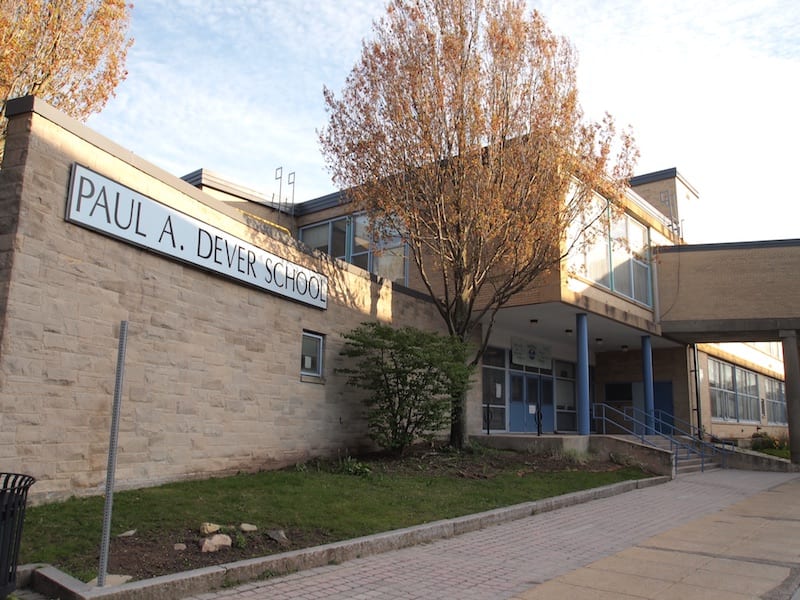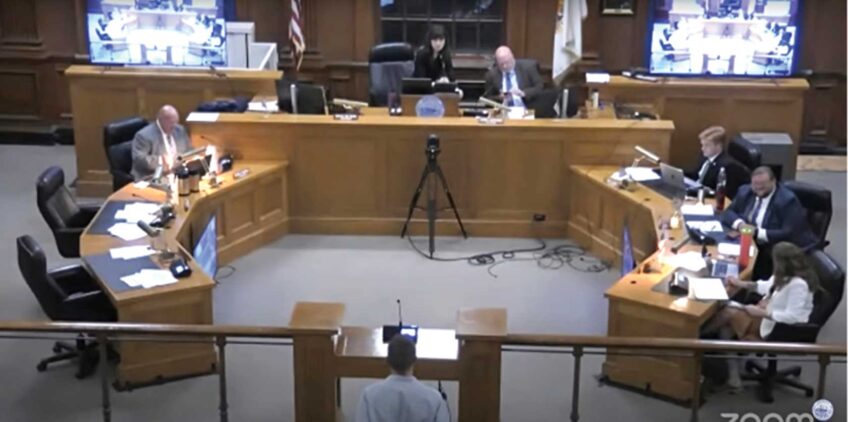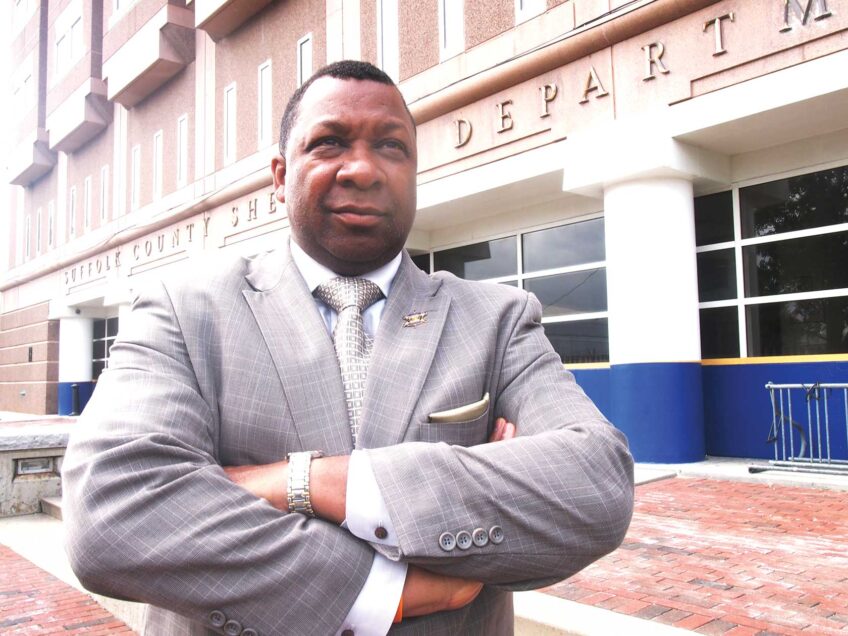Public school advocates push to end receivership
Thrive Act would expand graduation requirements beyond MCAS

Last year, when state Commissioner of Elementary and Secondary Education Jeff Riley raised the possibility of a state takeover of the Boston Public Schools, advocates fired back, citing the state’s poor record with the three districts it has had under receivership.
None of the three districts — Lawrence, Southbridge and Holyoke — had shown measurable improvements. They are all ranked in the bottom 10% of Massachusetts districts by the Department of Elementary and Secondary Education (DESE) school ranking system.
“They’ve been a failure,” said Mass Teachers Association President Max Page, of the state’s district takeovers. “Receivership has been an abject failure, even using the standards the state sets.”
This year, a group of state representatives and senators is seeking to end the practice of state receivership, with legislation they’re calling the Thrive Act. In addition to taking receivership off the table, the bill would end the use of the state’s MCAS exam as a graduation requirement and instead rely on a student’s classwork, essays and other output.
“Students should get their diplomas based on their academic work, not on the basis of a standardized test,” said state Sen. Adam Gomez of Springfield, one of the bill’s sponsors.
The testing regimen
Massachusetts is one of eight states that ties graduation to a student’s performance on a standardized test. Such measures became popular over the last 30 years as an education reform movement took hold across the country.
Backed by billionaire philanthropists such as Microsoft founder Bill Gates, Facebook founder Mark Zuckerberg and his wife Chan, and the Koch brothers, whose family made its fortune in oil and gas, education reformers sought to disrupt public schools and teachers unions with innovations including charter schools and the Teach for America nonprofit, which placed college students without teacher certification in public schools.
Massachusetts was in many ways at the forefront of the education reform movement, with its landmark 1993 Education Reform Act. At the time, the state was recovering from the 1990 recession and suffering from slow job growth. Lower-income cities and towns were hit hard and hobbled by proposition 2 1/2, which limited their ability to raise revenue via property tax — the main source of school funding.
Locally, state officials faced pressure from a lawsuit, McDuffy v. Robertson, which argued that the state’s system of funding schools through local receipts violated the state constitution, which places a responsibility for ensuring children are educated on the Legislature and governor. The Education Reform Act established baseline funding for districts and required that the state meet that funding level in cities and towns that lacked sufficient revenue to do so.
The act also set standards for school districts and set up an accountability system to make sure those standards were met. The MCAS exam was the key to that system. As the name Massachusetts Comprehensive Assessment System implies, the exam was meant to be a part of a broader system of assessments districts would use to determine a student’s educational attainment. In practice, however, the state only implemented the test.
“There was never an assessment system,” notes Jack Schneider, an associate professor of leadership in education at UMass Lowell and director of research for the Massachusetts Consortium for Innovative Education Assessment. “It’s a test on two subject areas with occasional appearances by science. It’s not a system.”
An imperfect measure?
Education reform advocates lauded the test for the window it provided into the disparate educational outcomes of students in different districts. Critics of the test objected to the requirement that students pass it to graduate and noted that DESE rankings depended almost entirely on the raw score, with far less regard for growth in scores. In 2017, Brighton High School was placed in turnaround status after the state ranked it as a level 4, one step before the level 5 designation that would trigger a state takeover. Teachers at the school noted its high concentration of students learning English as a second language. Such students are required to take the MCAS exam in English, regardless of their level of proficiency in the language.
“Kids are coming in from other countries, they may have missed a year of school,” said American Federation of Teachers Massachusetts President Beth Kontos. “When you’re looking at growth [in test scores], you’re seeing huge gains.”
But students’ raw MCAS scores count for more than the growth in their scores. As a district, Boston ranks relatively low in MCAS scores but ranks average in the state for growth scores. DESE, however, could designate BPS an “underperforming” district based on the MCAS scores, ignoring the fact that growth scores show students are actually learning.
Tang noted that under the Thrive Act, the MCAS would still be administered, as federal law requires that states use a standardized test to assess schools and districts. The Thrive Act would however give equal weight to student progress and the raw MCAS score in assessing students, schools and districts. Districts such as Boston, where 49% of students speak English as a second language and 32% are learning English, would likely see their assessments improve under the Thrive Act.
“There are much more meaningful ways to assess learning,” she said. “The Thrive Act would enable that to happen.”
The Massachusetts legislators’ push to roll back the state’s testing and accountability regimen comes as the corporate education reform movement is losing steam at the national level. Policies enacted during the administration of presidents George W. Bush and Barack Obama — the No Child Left Behind Act of 2001 and the Race to the Top initiative of 2009 — have drawn increasing criticism for incentivizing a paring-down of K-12 education into English and math test preparation.
The reform movement began to unravel during the four years of the Trump administration, during which prominent Republicans, including Education Secretary Betsy DeVos, pushed for school vouchers and argued for reductions in federal education funding, moves that critics said were part of an effort to dismantle public education.
“The neoliberal consensus where you had people like George Bush and Barack Obama agreeing on education policy — that era is over,” Schneider said. “The consensus has unraveled.”
Page, of the Mass Teachers Association, says the weakened state of the education reform movement presents an opening for progressive reforms.
“There’s been a movement more widely in the nation against high-stakes tests,” he said. “We have a governor and a legislature who are open to reconsidering high-stakes tests.”
State takeover
Under the 2010 Act Relative to the Achievement gap, DESE has the power to remove schools and whole districts deemed chronically underperforming from the control of mayors, school committees and other local elected bodies and and put them under direct control of the state. The chronically underperforming designation is applied based on MCAS scores, graduation rates and other metrics. In the case of Boston, Education Commissioner Riley and members of the Board of Elementary and Secondary Education have cited factors ranging from the district’s concentration of special education students in substantially separate classrooms to the inability of school buses to get students to school on time as factors for a possible state intervention.
Under state receivership, DESE officials hammer out a turnaround plan with a local stakeholder group including teachers, parents district administrators and school committee members. The state appoints a receiver to administer the district, who reports to the commissioner.
When a turnaround plan expires, the commissioner is required to conduct a review of the district to determine to what extent progress has been made before a district can exit turnaround status. None of the three districts under state control has yet exited turnaround status. Each of the three, Lawrence, Southbridge and Holyoke, is in the bottom 10% of schools in the state, by DESE’s own metrics.
Schneider said public school advocates are seeing growing opposition to district takeovers.
“You can’t throw a bad solution at a problem,” he said. “You might actually make things worse.”
With the passage of the Student Opportunity Act in 2019, which will increase state aid to districts by hundreds of millions of dollars and prioritize districts with high percentages of low-income students and students with special needs, education advocates are hopeful that state officials will provide needed resources to struggling districts rather than advocate for takeovers.
“We’ve been saying we need more nurses, more counselors, more student supports,” Kontos said. “Legislators understand that if we don’t do the right thing by kids, where will we be with our workforce? Companies want to come to Massachusetts. They need an educated workforce.”







